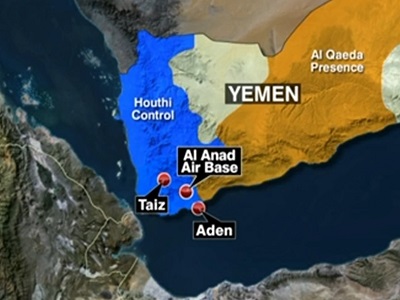
By Mohamed El Mokhtar
For the sake of historical truth, it is important to recall that Kingdom of Saudi Arabia has traditionally and consistently supported the harsh repression of Houthi rebels under the previous regime and as a result, prevented the question from being settled at a time where their demands were politically circumscribed and reasonable. The kingdom has, thus, lent its full support to the ousted president Abdallah Saleh through the turmoil of the Yemeni revolution and continued to do so even after its dismissal. Had KSA not weighed clumsily during the political wrangling preceding his ouster, he would probably have been completely sidelined, or at least weakened; thus, preventing a good deal of the current upheaval.
But Saudi Arabia has deliberately overlooked the situation when the rebels started overstepping their initial aims, i.e., regional autonomy during the early days of the transition period. This wrongful royal negligence was motivated by the desire of the late monarch, alongside UAE, to prevent, by all means, the Muslim Brotherhood-affiliated Al-Islah party, from winning the elections and therefore gaining a stronghold on power. Such peaceful rotation to power, through the democratic process, would ultimately have, in the eyes of the ruling monarchs, reveal the archaism of an inheritance-based autocratic mode of governance and threaten the privileges of royal dynasties.
Hence, KSA would rather have a minority Houthi rebellion control Yemen than see the democratically elected Muslim Brotherhood, or a leadership allied with it, in charge of power in neighboring Yemen, or so was its initial desire. But this turned out to be another erroneous calculation whose negative consequences the Kingdom is now desperately grappling with.
KSA has basically participated in the derailment of the transitional political period in Yemen as it has, also, in the past worked against its economic development by penalizing oil companies willing to invest in the impoverished country or expelling Yemeni migrant workers, or simply making it quasi impossible for its nationals to find a work visa to enter the kingdom, etc.
Besides promoting vicious anti Shia propaganda over the years, and thus sowing the seeds of confessional hatred and sectarianism, KSA also, deliberately squeezed its poor neighbor, before and after, its costly revolution. The political transition failed primarily because of the economic crisis that exacerbated the energy deficit, worsened the food shortage, and compounded the security problems already tearing apart the country; all these shortcomings could have been, at least, drastically reduced, had Yemen received the vital investments it desperately needed and was, countless times, promised by its wealthy neighbors and Western backers.
Now feeling the heat from a disaster unfolding at its doors, partially, if not mainly, of its own making, KSA finds itself, once again, in an unbearable conundrum. If it does not intervene, it may well be in a position geographically adjacent to an openly hostile entity, or one allied to a regional rival power. Yet an intervention, without clear objectives and sound strategic aims, doesn’t guarantee success. If anything, a military intervention could speed up the collapse of the Yemeni state. Given that the Houthi are an integral part of the country’s social fabric, the ongoing Arab military adventure, under the aegis of the Saudis, would likely accelerate the process of social disintegration inherent to the institutional downfall of the state.
Historically any a one-sided intervention, in an internal conflict, has been proven a failure since it never solves the underlying structural causes of civil war. It may temporarily tip the balance in favor of one faction and thus win a tactical battle but cannot guarantee a total victory. For any military intervention to be successful, it has to be accompanied by a political settlement that addresses the legitimate grievances of all warring parties including, in the case of Yemen, the southerners.
The elected president Abad Rabu Mansour Hadi wanted perhaps to do his job but had nothing with which to back up his efforts in managing a political transition strewn with obstacles. Besides Saudi thoughtless meddling, the US, and the West in general, have their share of blame in this regional mayhem. They blackmailed a weak president, at a critical historical juncture, with minimal offers of aid in exchange for a disorderly and incoherent war on a vast swath of the country’s territory. This endeavor subsequently alienated an important segment of the Sunni population traditionally known for their tribal bond and attachment to their land.
Thus, the Yemeni version of the “war on terror” could not have come at a worse time. It has widened the theater of military operations inside the country exacting a high toll on an already fragile economy, ultimately bringing about its collapse.
Therefore, it is not just KSA that is responsible for the materialization of this multidimensional conflict whose implications are various and enormous. The Iranian thirst for regional hegemony, and their various intrusions in the game of strategic reconfiguration, underway in the region since the destruction of the Iraqi state, is another crucial factor at play here. The tectonic shift in the balance of power that ensued from this dynamic appears today to be a clear indicator of overall Arab vulnerability, divisiveness, and collective decline.
The incompetence and lack of strategic vision of Arab tyrants is certainly one cause, and a resounding example, of the Middle East’s current predicament.
– Mohamed El Mokhtar Sidi Haiba is a social analyst and political commentator. He contributed this article to PalestineChronicle.com.





